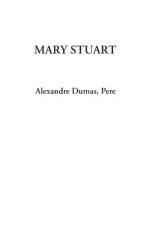The discharge of a small piece of artillery answered William’s joke; but as the night was too dark for one to aim to such a distance as that already between the castle and the boat, the ball ricochetted at twenty paces from the fugitives, while the report died away in echo after echo. Then Douglas drew his pistol from his belt, and, warning the ladies to have no fear, he fired in the air, not to answer by idle bravado the castle cannonade, but to give notice to a troop of faithful friends, who were waiting for them on the other shore of the lake, that the queen had escaped. Immediately, in spite of the danger of being so near Kinross, cries of joy resounded on the bank, and William having turned the rudder, the boat made for land at the spot whence they had been heard. Douglas then gave his hand to the queen, who sprang lightly ashore, and who, falling on her knees, immediately began to give thanks to God for her happy deliverance.
On rising, the queen found herself surrounded by her most faithful servants—Hamilton, Herries, and Seyton, Mary’s father. Light-headed with joy, the queen extended her hands to them, thanking them with broken words, which expressed her intoxication and her gratitude better than the choicest phrases could have done, when suddenly, turning round, she perceived George Douglas, alone and melancholy. Then, going to him and taking him by the hand—
“My lords,” said she, presenting George to them, and pointing to William, “behold my two deliverers: behold those to whom, as long as I live, I shall preserve gratitude of which nothing will ever acquit me.”
“Madam,” said Douglas, “each of us has only done what he ought, and he who has risked most is the happiest. But if your Majesty will believe me, you will not lose a moment in needless words.”
“Douglas is right,” said Lord Seyton. “To horse! to horse!”
Immediately, and while four couriers set out in four different directions to announce to the queen’s friends her happy escape, they brought her a horse saddled for her, which she mounted with her usual skill; then the little troop, which, composed of about twenty persons, was escorting the future destiny of Scotland, keeping away from the village of Kinross, to which the castle firing had doubtless given the alarm, took at a gallop the road to Seyton’s castle, where was already a garrison large enough to defend the queen from a sudden attack.
The queen journeyed all night, accompanied on one side by Douglas, on the other by Lord Seyton; then, at daybreak, they stopped at the gate of the castle of West Niddrie, belonging to Lord Seyton, as we have said, and situated in West Lothian. Douglas sprang from his horse to offer his hand to Mary Stuart; but Lord Seyton claimed his privilege as master of the house. The queen consoled Douglas with a glance, and entered the fortress.
“Madam,” said Lord Seyton, leading her into a room prepared for her for nine months, “your Majesty must have need of repose, after the fatigue and the emotions you have gone through since yesterday morning; you may sleep here in peace, and disquiet yourself for nothing: any noise you may hear will be made by a reinforcement of friends which we are expecting. As to our enemies, your Majesty has nothing to fear from them so long as you inhabit the castle of a Seyton.”




